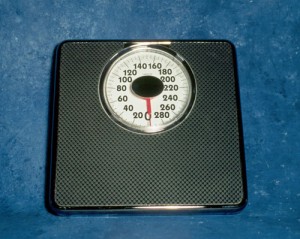
It’s the same old story: You’re standing on the scale, watching the digital numbers tick by, wishing you could have peed one more time, until, finally, the scale settles on a number.
Love it or hate it, can you trust it?
There are a lot of different factors that can affect your scale’s reading, either by adding a few pounds or taking them away.
Next time you fixate on tenths of pounds every morning, keep a few things in mind:
When did I last eat?
If you just have a big meal, all that food hasn’t had a chance to digest yet, and is just sitting there in your belly. It’s just like you were holding that meal in your hands when you stepped on the scale; the food has weight and that weight gets added to yours. Meals take anywhere from 6-12 hours to digest.
What did I last eat?
Often, the healthiest foods are the heaviest in terms of weight. Fruits and veggies are great for your health and your waistline, but because they are so full of water and bulky fiber, they can temporarily add pounds to the scale.
If you ate a salty meal, like canned soup or a frozen dinner, the scale may also take a temporary jump. Your body retains water after you eat a lot of salt to dilute the excess sodium in your system, which can cause you to bloat.
Going light on carbs could explain a false lower reading. Carbohydrates, your body’s number one source of energy, are like a sponge- they hold water in your body. If you cut carbs, you risk dehydration, as there is nothing to prevent water from going straight through your system. The scale may read a bit lower, but it’s just because you are missing water, not from fat loss.
What did I have to drink?
If you just polished off a bottle of water, the weight of that water will show up on the scale. A liter of water weighs about 2 pounds, so if that water hasn’t had a chance to get through your system, it’s going to add to your weight.
If you had a few drinks last night, or a few cups of coffee this morning, you are probably dehydrated, as both are a diuretic, and you may be weighing in a few pounds less that your actual weight. Once the missing water is replaced in your system, your weight should return to normal.
Water is one of the biggest causes of inaccurate scale readings. It takes 3,500 calories to gain or lose a pound of fat; that’s nearly impossible to do in a day.
So, if you get an unexpected scale reading, take it with a grain of bloat-inducing salt. And remember, it’s just a number. Don’t let it make or break your day.
Body fat is the only true way to measure the composition of your body, and track real progress, so to get your body fat checked, make an appointment.

Leave a Reply